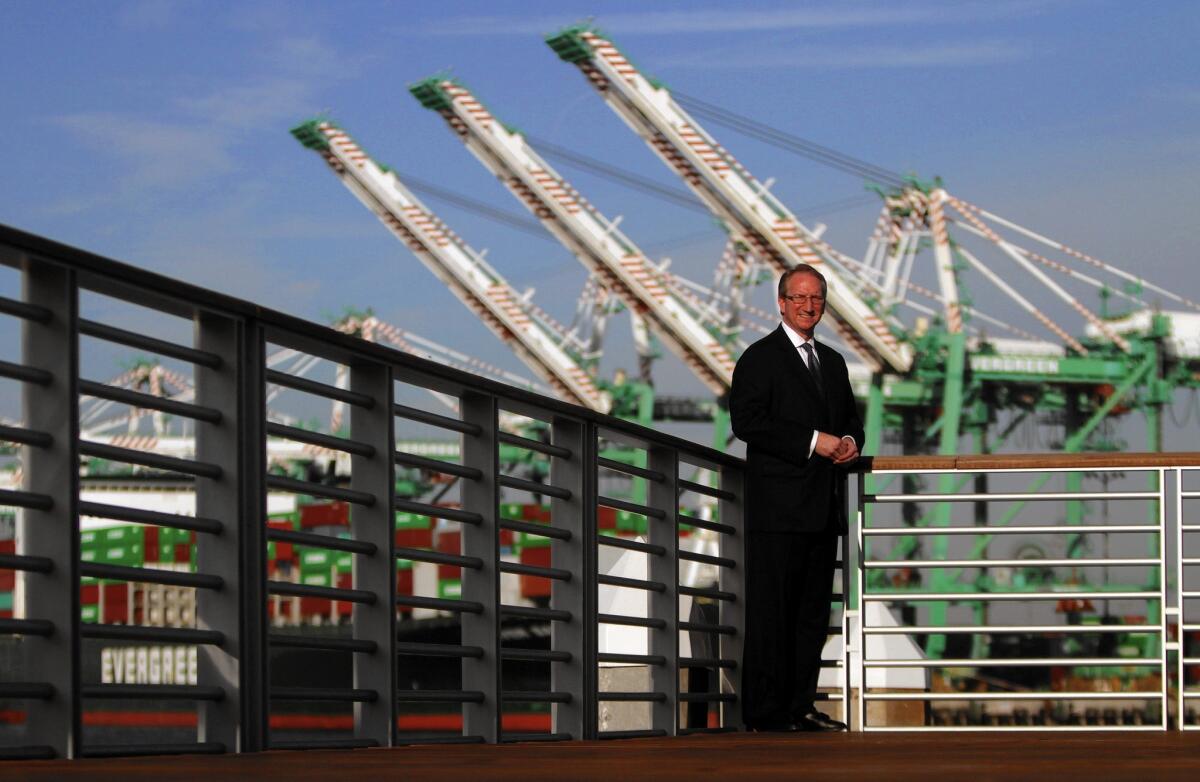How I Made It: Gene Seroka

- Share via
The gig: Gene Seroka, 50, is executive director of the Port of Los Angeles, the nation’s busiest seaport. The former shipping line executive, who started in the job four months ago, manages an organization with a $939-million budget that handled $285.4 billion worth of cargo last year. The region’s economic engine faces increased competition from ports across the country and abroad, and Seroka says his job is to keep the port squarely in the nation’s No. 1 position.
A life of travel: During his 26-year career with American President Lines, Seroka lived around the world, including in Shanghai; Jakarta, Indonesia; Singapore; and Dubai. He also traveled extensively. He has visited the Great Wall of China, the terra-cotta warriors near Xi’an, China, and the Dead Sea and the ancient city of Petra in Jordan. “My most recent two passports are both about 2 inches thick,” he said. “I feel like one of the luckiest guys in the world.”
Business overseas: Overall, it’s not that different, Seroka said: “Business is business and people are people.” But one must learn the subtleties, he said. For example, in Asia, hand over your business card with two hands. In the Middle East, despite the often sweltering heat, wear a blue suit, white shirt and dark tie.
“You have to have both a cultural and business sensitivity,” he said. “It’s very important you study up as much as you can.”
It also helps to learn the language, or at least make an effort to show you are serious about staying for the long haul. In China, Seroka picked up Mandarin. “I have been out of practice for a little while,” he said, “but I hope to brush up on that in the not-too-distant future.”
A grounded upbringing: Seroka grew up in Slidell, La., about 30 miles outside New Orleans. His parents worked in the airline industry, his father in marketing for American Airlines and his mother as a flight attendant. He said his family instilled in him several rules: Go to school, make good grades, play sports and treat your mom the right way. In “Seroka vernacular,” treating your mom right meant making “sure you treat people with respect whether they be your colleagues, superiors or subordinates.”
For fun, Seroka played baseball and surfed while visiting his grandparents in Florida. As a kid, he had dreams of playing in the major leagues, but something stopped his rise in college. “I couldn’t hit the curve.”
An unassuming start: Shortly after graduating from the University of New Orleans with an MBA, Seroka ran into a buzz saw: the 1980s oil glut. The surplus made times tough in energy-rich New Orleans, he said. He applied for jobs in several industries. But the rejection letters stacked up.
So he turned to a search firm. “Luckily they had done some work with APL” — the shipping line. In 1988, he became a sales support representative in American President Lines’ Cincinnati office.
Climbing the ladder: Seroka was with APL for more than a quarter of a century, handling sales and management for the world’s seventh-largest ocean carrier. His first overseas posting was in China from 1999 to 2003. Before Los Angeles Mayor Eric Garcetti tapped him to lead the L.A. port, Seroka was back in the United States as head of APL’s commercial division for the Americas.
“I never had a view of just simply climbing,” Seroka said. Instead, he said, he took the work ethic his parents instilled, put his head down and achieved results that the company expected. That, he said, presented the opportunity for jobs with greater responsibility. “ ‘Learn first before you talk’ has always been a credo that I’ve followed.”
Goals to accomplish: Maintain the port’s premier position in the United States, while growing cargo traffic. Seroka said other goals are to fix the congestion currently plaguing the complex and ready the port to handle ever-larger container ships.
Spare time: There’s not much of it, said Seroka, who just returned from a work trip to Europe where he visited five countries in six days. But when he can, he’ll go for a run, lift weights or swim. Then there’s baseball to watch.
A thinking game, baseball is “not dissimilar to business, because there’s not only one answer involved here,” Seroka said. “You are going to have to think down the line about what the next move is going to be.”
Twitter: @khouriandrew
More to Read
Inside the business of entertainment
The Wide Shot brings you news, analysis and insights on everything from streaming wars to production — and what it all means for the future.
You may occasionally receive promotional content from the Los Angeles Times.











